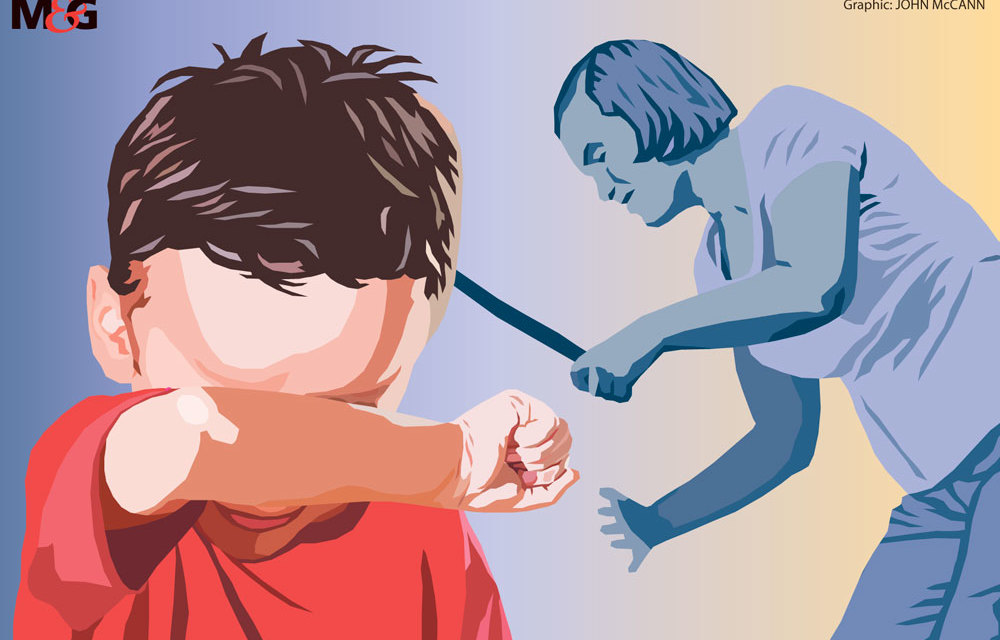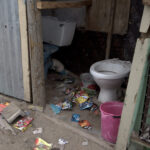New research reveals complex relationships between harsh parenting and violence later in life for children.
Hitting your children could increase their risk of becoming abusers — or of being victims of abusers, according to new research.
Gender activists say the new study is all the more reason to outlaw corporal punishment in the home to help to break South Africa’s cycles of abuse.
As part of a study, 10 178 men and 3 106 women from six low- and middle-income countries in Asia and the Pacific were interviewed about their experiences of violence in the home, whether as children, partners or parents. Researchers argue that the findings may also be applicable to other countries.
The research, published this month in The Lancet Global Health journal, showed that on average at least 52% of participants said they had experienced some form of childhood trauma, such as sexual, physical or emotional abuse. Among women, this was strongly linked to being subjected to intimate partner violence as adults.
The study also found that women who were ill-treated as children, who were in abusive relationships, or who had witnessed their mothers being abused were more likely to resort to harsh parenting practices, such as smacking or beating.
About 75% of women, and slightly fewer men, said they or their partners smacked their children at least sometimes.
Men who witnessed their mothers being abused and who were mistreated as children were also more likely to grow up to be abusive partners. Men’s use of corporal punishment in the home was also associated with childhood trauma, researchers found.
But the study also revealed that female partners often have a greater influence on whether men raise their hands to children. The research showed that men are more likely to beat their children if they see their female partners do it first.
Study co-author and director of the gender and health unit of the Medical Research Council (MRC), Rachel Jewkes, says the data illustrate that women aren’t only victims of violence. “Violence against children is not only a man’s problem. Women are part of what’s driving the acceptability of violence in society,” she says.
In South Africa, one in five children will experience sexual abuse by the age of 17, according to a 2016 University of Cape Town study published by the Centre for Justice and Crime Prevention.
Meanwhile, a 2009 MRC report found that one in three men admitted to having raped a woman. More than half of these men said they had been abused as children.
Should the government tell you how to raise your kids?
Dean Peacock, the co-executive director of the gender equality advocacy organisation Sonke Gender Justice, warns that being raised in an abusive home doesn’t necessarily mean children will grow up to be abusers or victims of abuse, and that many factors such as alcohol and inequality contribute to violence.
He says the connection between childhood abuse and violent adults does mean that banning corporal punishment such as beating and smacking in the home could be key to protecting women and children and to ending the vicious cycle of abuse.
“All too often what starts off as discipline ends up as abuse,” he says.
Although physical discipline in the home is not against the law, corporal punishment in schools was outlawed in South Africa in 1997. A 2013 study published by the Centre for Justice and Crime Prevention found that nearly 74% of schools in some provinces still reported physically disciplining pupils.
Peacock says allowing corporal punishment in the home sends a clear message that violence is an appropriate response to difficulty.
“Why are we against hitting women but willing to hit children, who are the most vulnerable in society?” he asks.
Although some parents may oppose a government ban on physically disciplining children, evidence and not personal beliefs should inform policy, he says.
Early interventions can help turn the tide
Both Jewkes and Peacock say programmes aimed at young people, whether as new parents or students, could help to change parenting and gender norms that breed violence.
Peacock adds that resources for survivors must also be made available in communities. “Young men who experience violence in the home and don’t get help are more likely to perpetrate violence,” he says.
Lisa Vetten, a research associate at the Wits Institute for Social and Economic Research, says there might not be the budget for the kind of programmes that are needed. Social welfare budgets have largely stagnated in the past decade and international donors are reluctant to fund programmes in a middle-income country, she says.
Peacock says the Lancet study should also bolster calls for a national plan to tackle violence in South Africa. “This study is one more bit of evidence that should be prompting our government’s response to children’s experience and exposure to violence. It’s a travesty that we have no national strategic plan to address domestic and gender-based violence in South Africa.”
Joan van Dyk was a health journalist, senior health journalist and news editor at Bhekisisa between 2017 and 2023.




